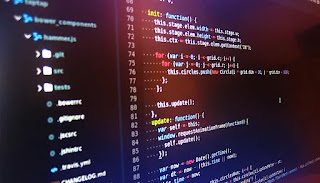5 Important JavaScript Tips for Beginners
Most likely, if you've ever been interested in web
development, you've heard about JavaScript.
The programming language JavaScript is object-oriented. It
is employed by developers to create dynamic, interactive client-side
(front-end) web sites.
Additionally, it works in conjunction with HTML and CSS to
create websites and web apps.
In 2022, there will be a sizable market for application
development. Anyone committed and determined to master programming skills has
profitable choices, including working full-time or as a freelance developer.
Start with basic
logic
Start with a fairly fundamental idea and assertion regarding
the topic. Put the fundamentals into practice after learning them. Numerous
times, when applying rules using programming, you'll overlook the fact that a
built-in function already exists for it, such as slicing an array. Many extra
features may stop working if you encounter an error when running the JavaScript
code.
Inverted commas or a single colon may be the culprits here.
These occurrences take place as a result of a lack of knowledge of the
foundations. A basic loop like for, which, or do while is frequently used in a
single application. Among the most basic programming structures is the loop.
If you are not acquainted with looping and other basics,
learning to code and even getting the chance to work for a company can be
rather challenging. It's crucial to brush up on your foundations because they
offer a firm base upon which to build a solution's intricate logic and
reputation.
Comment a lot
Any programming language you learn should make use of
comments. Your code will be easier to read and understand with the help of
comments.
You will frequently lose track of the meaning of some
grammar at the beginning of the function of a specific line of code you
created. Write notes about any line you think you might forget for subsequent
reference to spare yourself some trouble. You should start off writing more
comments than real code.
Your command of the language will improve with practice, and
you'll write comments in less of your code. Your program will eventually have
either no comments at all or very few.
An object-Oriented
Strategy should be used
The approach to programming that is most often used now is
object-oriented. Since C++ introduced the object-oriented methodology, its
popularity has skyrocketed. All of the primary languages used today were
created using exclusively object-oriented programming. An object-oriented
strategy is concentrated on a single object.
The thing then becomes a basic thing. Then, using this
object as a foundation, properties and functions are added to the page. You can
also write code the conventional way, starting at the top and working your way
down, without using any functions or objects. This is far too ambitious and
shouldn't be tried. We should employ a functional approach while writing code,
and if we use functions, we should use objects.
Therefore, make an effort to convert your lengthy code to
object-oriented code as soon as possible, and always create your program in an
object-oriented manner. You'll frequently examine object-oriented techniques
when you examine other people's code. It's ideal if you get your hands on
JavaScript if you want to master it.
Make documentation of
your code
Making a few practice projects will be part of your learning
JavaScript. Make some documentation regarding any endeavour, no matter how tiny
or unimportant it may seem.
A "How to" that explains how to manage the project
can be included in the documentation. To describe what the project does, you
can also include "Read Me" files.
Making documentation of all your projects is the goal. You
will initially create incredibly rudimentary documentation that simply provides
the most fundamental details. Later, you'll keep including more and more
information.
Your comprehension of what you have done will enhance with
documentation. Beginners frequently merely code along with instructions. Unfortunately,
these methods frequently result in novice programmers forgetting what they've
done and failing to comprehend their code.
Use JSLint
A debugger called JSLint was made by Douglas Crockford. Put
your script in the box, and it will quickly check it for errors and issues.
A source file for JavaScript is examined by JSLint. If a
problem is found, a notification containing a description of the problem and an
estimated location within the source is sent. While it regularly happens, the
problem isn't usually a syntactic one.
JSLint examines structural problems as well as stylistic
conventions. It doesn't mean your software is accurate, though. It merely
offers a second set of eyes to help spot problems. Run a script through JSLint
before approving it to ensure that you haven't made any mistakes.
 Reviewed by Namera Farooq
on
13:11
Rating:
Reviewed by Namera Farooq
on
13:11
Rating:






